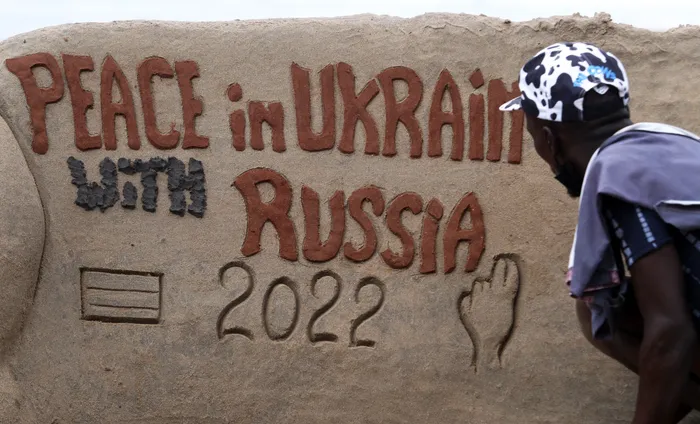African perspective on the Russian and Ukrainian conflict

Picture: Doctor Ngcobo/African News Agency(ANA) – Nkandla born sand artist Spha Buthelezi works on a sand sculpture in North beach, Durban, South Africa, where he calls for peace between Ukraine and Russia amid the the latter’s ongoing invasion of Ukraine, and NATO’s continued arming of Ukraine, that has seen thousands leaving the country seeking safety in neighbouring countries such as Poland.
By Jabulani Sibande
While the Russia-Ukraine conflict is seemingly one of the most unanticipated conflicts of the post-Cold War era, as early as November 2021, the United States (US) had alerted President Volodymyr Zelensky of the possibility of a Russian invasion.
The Guardian reported that the US was concerned about the unusual movements of Russian troops near Ukraine’s border and dispatched Bill Burns, the CIA director, to Moscow to monitor the situation in early November 2021. It was reported in December that the intelligence had found that Russia was planning a “multi-front offensive in early 2022 involving up to 175,000 troops”. These warnings were continuously brought forth to Zelensky, who said the Ukraine had been aware of the threat since 2014.
Anxious about the possible invasion, the US took a Diplomatic hard power stance on the matter. In a White House statement released on February 15, 2022, the US affirmed its position and pledged to stand with Ukraine and respond decisively with its allies. Zelensky was keen on his diplomatic approach to de-escalate the tensions. However, Russia had other ideas and took a more violent and aggressive approach leading to the invasion of Ukraine on February 24.
Instability and uncertainty have once again taken centre stage in world politics.
The United Nations (UN) quickly responded to this crisis by adopting a resolution on March 2, 2022, six days after the invasion, to condemn the Russian “aggression” against Ukraine. While the decision to condemn Russia’s actions was unanimous in the West, Africa and other Asian countries painted a different picture with disparities in their voting patterns.
This disunity is attributable to the historical significance of the Cold War. The then pro-West/pro-Russian state of affairs still significantly impacts contemporary African diplomacy. South Africa and Angola both abstained in the voting session. These states were at the heart of the proxy wars that transpired during the Cold War. Both the African National Congress (ANC) and the Popular Movement for the Liberation of Angola (MPLA) were communist liberation movements affiliated with the Soviet Union. These political parties have remained the ruling parties in their respective countries and have opted to be neutral in the Russia-Ukraine conflict.
On the economic front, South Africa and Russia are part of BRICS. According to the Observatory of Economic Complexity World statistics, in 2020 South Africa exported $587 million worth of goods to Russia. Thus, self-interest is clearly at play, and South Africa seems unwilling to risk jeopardising its strong relationship with Russia. The western African state Senegal also abstained from the UN General Assembly resolution and was strategic in this matter.
Senegalese President Macky Sall, who holds the chairpersonship of the African Union (AU), opted to have a direct dialogue with the President of Russia to call for a ceasefire while avoiding taking a stance on the UN resolution.
In 2021, Senegal imported goods worth US$554 m – US$79 m from Russia alone. This fully demonstrates that self-interest motivated by economic gains determines the position of each country.
In the North African region, Algeria is another notable state that abstained from voting and has recently held talks about the possibility of joining the economic alliance of BRICS. Algerian President Abdelmadjid Tebboune has said that his country is the largest natural gas exporter on the Continent, making Algiers eligible to join the organisation. This might partly have informed the unwillingness of Algeria to condemn Russia, as the country is not prepared to risk its future economic and diplomatic relations with Moscow.
Moreover, the recent Stockholm International Peace Research Institute noted that in a collective sense, 49 percent of Africa’s military equipment is imported from Russia, which amounts to almost half of the imports of arms. This means that sanctioning Russia will risk arms sales to Africa, leaving nearly half of the Continent’s military arms vulnerable to instability and chaos.
These developments have become a concern in the West and Ukraine, resulting in Zelensky’s address to the AU on June 22, 2022 to garner support against Russia. In his speech, Zelensky deployed his charm offensive strategy, highlighting Ukraine’s peacekeeping missions in African conflicts.
Furthermore, he criticised the Russian invasion, blaming it for the rising food prices and emphasising the pain it has caused the Ukrainian people and the world at large. However, Zelensky arguably failed, in light of a lack of interest by the majority of African heads of state because it was only five of the fifty-five invited African states attended. This posture of African leaders demonstrates Africa’s mistrust of the West. Africa seems to have learned from Nato’s intervention in Libya and the assassination of Muammar Gaddafi under the guise of responsibility to protect Libyan citizens.
Sibande is a Youth Employment Service (YES) Programme Intern at the Institute for the Future of Knowledge.
This article was exclusively written for The African. To republish, see terms and conditions.